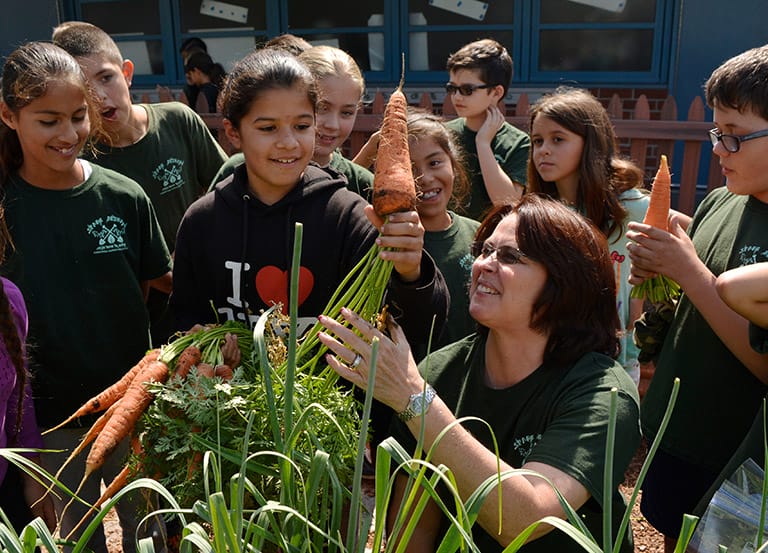Fruits of Their Labor

Lori Clock’s “Resiliency Garden” helps schoolchildren cultivate life skills
Inside her fifth-grade classroom, Lori Clock teaches her students about math, language arts, and other subjects. But outside, among snapdragons, monarch butterflies, and vegetables, they learn something different, but equally as important.
And they get their hands dirty—literally—doing it.
Clock, a PhD student in the School of Educational Studies (SES), created a “Resiliency Garden” for students at the La Mirada elementary school where she has taught for the past 30 years. The lush space helps both students who are at-risk or exhibit leadership potential to grow critical social-emotional skills through gardening.
“It teaches them responsibility,” Clock said. “It teaches them delayed gratification. It teaches them teamwork.”
Social-emotional skills (sometimes called “soft skills”) are noncognitive and help individuals manage emotional responses, build healthy relationships, and develop other capacities that help them succeed. Research connects these skills with improved classroom engagement and academic outcomes, said Susan Paik, an SES associate professor serving on Clock’s dissertation committee.
The students of Gardenhill Elementary School are learning patience, discipline, self-awareness, and how to get along with others, she said.
“Clock has taught them how to develop these key skills, and they become even more engaged in school as a result,” Paik said.
Clock’s dissertation focuses on resilience—the ability to “bounce back” from challenges—and how it can be fostered in school-age children.
For the nearly 200 students who have come through the garden, there have been plenty of challenges: What is the best type of fertilizer to use? What types of plants complement each other when grown together? What vegetables take nutrients out of the soil—and which ones put them back? Students learn how to turn and amend soil, determine watering needs, and identify insect pests and how to deal with them without using pesticides, among other tasks.
“This is not your typical school garden,” Clock said.
And in many cases, gardening leads to positive changes.
One autistic student who harbored a fascination with insects and was often teased became the garden’s resident expert on pests and non-toxic, non-lethal ways to get rid of them. And the teasing stopped. Another student who had difficulty making friends and speaking in public ended up entering a storytelling contest and going to science camp. Similar examples abound.
“Lori is a fantastic teacher, and she has absolutely made a difference for these children,” Paik said.